Canadians recognize we need to stop COVID everywhere, before this pandemic ends.
June 15, 2021
In May of 2021, Abacus Data conducted the second wave of the national public opinion survey commissioned by World Vision Canada, a global relief, development, and advocacy organization. As vaccination rates increase and optimism about the end of the pandemic rising, the study explored how Canadians felt about the global impact of Covid-19.
Here is what we found:
CANADIANS HAVE NOT LOST SIGHT OF THE PANDEMIC AS A SERIOUS ISSUE AND WORRY.
Although we have made tremendous progress in our fight against Covid-19 and optimism about our domestic situation has increased, Canada has not changed our underlying worry about Covid-19. The spread of infectious diseases remains the top global concern for Canadians and global variants have become a major concern.
- 65% are extremely or very concerned with the spread of infectious diseases (down 3 points since May 2020).
- 70% have thought about the risk of new variants emerging and coming to Canada. This includes 36% who have thought about this a great deal.
As Canadians have had time to process the impacts of the pandemic, many are thinking about what this means for their lives at home, but also about what it means for others around the world.
Canadians are least likely to be preoccupied by the impact on their jobs or future retirement and more likely to be thinking broadly. For example, 6 in 10 spend at least some time thinking about the risk of variants emerging and coming to Canada. Furthermore, 58% spend time thinking about the impact on those living in poor countries around the world.
In fact, nearly 7 in 10 Canadians are following news about the impacts of the pandemic in poorer parts of the world at least a little. While only 7% are following closely, many Canadians are following what’s happening in other parts of the world, including in poorer areas.
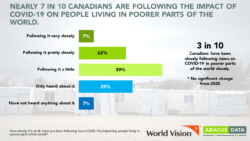
NEARLY ALL CANADIANS RECOGNIZE THE MUCH HIGHER RISK OF COVID-19 FACED BY THOSE LIVING IN POVERTY/FRAGILE CONTEXTS.
Canadians recognize that some populations are at higher risk factors for much worse impacts of COVID-19. For example, a large majority of Canadians say the impacts of COVID-19 have much bigger consequences for those who do not have a stable home with access to healthcare.
In fact, compared to the impact on Canadians, a majority recognized that the impacts of COVID-19 will be worse (much worse/worse) for:
- Those living in high-density communities in poor countries where lots of people live close together 71%
- Those living in communities in poor countries with limited healthcare facilities and professionals: 71%
- Those living in war-torn regions where millions have been forced to leave their homes: 69%
- Children living in refugee or displaced persons camps: 69%
- The world’s most vulnerable populations: 68%
- Those living in refugee or displaced persons camps: 68%
- Those living in areas with high levels of poverty: 69%
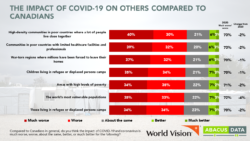
Canadians recognize that the impact of COVID-19 at home will be nowhere near as bad as it is for those living in places that are more vulnerable, such as for those living in poverty and fragile contexts around the world. This does not, however, mean that they fully understand the challenges that these more vulnerable populations face. Consider vaccination rates.
CANADIANS OVERESTIMATE THE VACCINATION RATES AROUND THE WORLD
Canadians consistently overestimate the percentage of populations around the world that have received at least one vaccination. Forty-eight percent of Canadians believe that the percent of those vaccinated in refugee or displaced persons camps is more than 5%. This sentiment is echoed in perceptions of vaccinations of those living in Africa (62%) and Syria (61%).
World Vision surveyed almost 350 households in refugee contexts like Jordan, Venezuela and the DRC, and only 1 person had been vaccinated. So, while Canadians understand that vaccination rates in these places are lower, they underestimate the scope of the disparity.
A majority (61%) of Canadians believe that it is morally wrong that people living in richer countries have access to vaccines before those in poorer countries. It is not, however, just a moral imperative. Canadians understand that what happens in the rest of the world has impacts here.
AS MUCH AS THEY ARE CONCERNED ABOUT THE CONSEQUENCES FOR THOSE LIVING ABROAD, CANADIANS ALSO SEE THE GLOBAL SPREAD OF COVID-19 AS HAVING A DIRECT IMPACT ON THEIR OWN LIFE BACK IN CANADA.
A large majority of Canadians (85%) are at least somewhat worried about new variants of Covid-19 developing somewhere else and coming to Canada. Nearly 3 out of 10 Canadians reported being extremely concerned that this will happen over the next year.
This is also seen through our outlook on our economic recovery. Canadians (82%) are at least somewhat worried that worsening COVID infections in less developed parts of the world will lead to a slow economic recovery in Canada.
Canadians understand the implications of COVID-19 spreading within these camps, and they also see the potential for a wider impact on more than just those living in these camps. A majority of Canadians (78%) recognize that if we don’t vaccinate everyone in the world, new variants will continue to surface. Two-thirds agree that the vaccination rate impacts us all such that none of us are vaccinated until all of us are vaccinated.
74% of Canadians feel that with our world being so interconnected, a return to normal cannot be possible until the spread of the disease is under control across the globe.
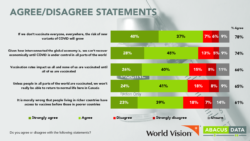
Furthermore, 87% of Canadians believe that a variant emerging from a refugee camp has the potential to make its way into Canada and potentially even put us back into a restricted lifestyle. Nearly 8 in 10 Canadians think that the scenario might happen, while a third feel that this is likely to happen.
THE GOVERNMENT OF CANADA’S RESPONSE TO HELPING WITH THE COVID-19 PANDEMIC GLOBALLY
Canadians currently believe that the Canadian government’s response to helping poorer countries has been “too little” (29%; an increase of 16 points from May 2020).
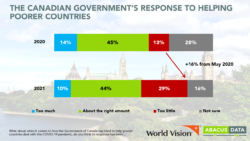
There is widespread support for (81%) and very little resistance to the Canadian government ensuring that excess vaccines that Canada has purchased go to the world’s poorest and more vulnerable populations.
Support is also high for several other initiatives. Waiving intellectual rights on COVID vaccines so that poorer countries can manufacture them quickly is supported by 7 in 10 and two-thirds support Canada increasing contributions to COVAX and working with other rich countries to ensure everyone gets vaccinated in poorer countries.
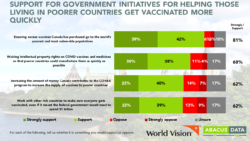
UPSHOT
According to our other polling, Canadians are increasingly of the belief that the worst of the pandemic is behind us. We are entering the hope phase of the pandemic as vaccination rates increase and cases decline in most of the country. We should not confuse this with a sense that the pandemic is over or that Canadians are not still preoccupied with the pandemic.
The top global issue continues to be the spread of infectious diseases. More importantly, there is a concern and worry about new variants and their impact not only on our health but on our economic recovery. Many even recognize the possibility that our failure to vaccinate everyone in the world could lead to a vaccination-resistant strain of COVID-19.
The short of it is that a full COVID-19 recovery in Canada means a COVD-19 recovery worldwide.
METHODOLOGY
This survey was commissioned and paid for by World Vision Canada. It was conducted with 2,000 Canadian adults from May 26 to June 1, 2021. A random sample of panelists were invited to complete the survey from a set of partner panels based on the Lucid exchange platform. These partners are typically double opt-in survey panels, blended to manage out potential skews in the data from a single source.
The margin of error for a comparable probability-based random sample of the same size is +/- 2.19%, 19 times out of 20.
The data were weighted according to census data to ensure that the sample matched Canada’s population according to age, gender, educational attainment, and region. Totals may not add up to 100 due to rounding.



